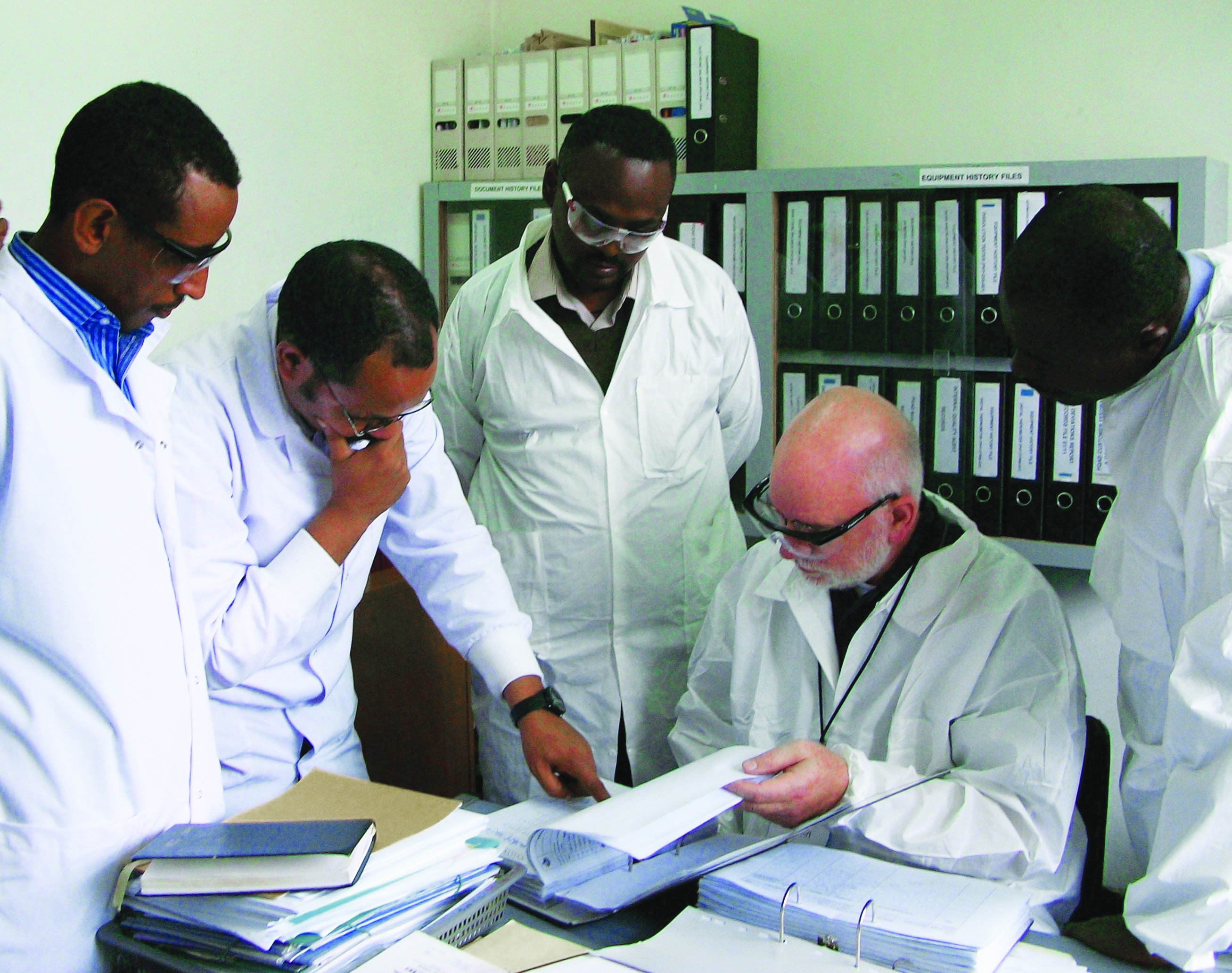
Staff members from the Ethiopian Food, Medicine and Health Care Administration and Control Authority’s quality control laboratory review quality management documentation with an external assessor
In July 2018, the Ethiopian Food, Medicine and Health Care Administration and Control Authority (EFMHACA) selected the National Metrology Institute of Ethiopia (NMIE) as sole service provider for calibration of medicines testing equipment in the country’s national quality control laboratory (NQCL). The agreement marks an important milestone for both organizations, with NMIE making a key addition to its technical capacities and EFMHACA strengthening its organizational sustainability by significantly reducing service costs through local contracting.
EFMHACA manages NQCL, relying on test results from the laboratory to inform decisions on approving new medicines for the Ethiopian market and on any needed regulatory actions for products already in circulation. With technical assistance from the Promoting the Quality of Medicines (PQM) program—which is funded by the U.S. Agency for International Development (USAID), further supported in Ethiopia by the U.S. President’s Malaria Initiative (PMI), and implemented by the U.S. Pharmacopeial Convention (USP)—NQCL achieved ISO/IEC 17025:2005 accreditation in 2011, signifying that it meets international standards for medicines testing and demonstrating Ethiopia’s commitment to ensuring nationwide access to quality-assured medicines.
“Equipment calibration is one of the requirements of a laboratory quality management system,” explains EFMHACA Deputy Director General Bikila Bayissa, specifying that NQCL must regularly calibrate its laboratory instruments to maintain ISO/IEC accreditation. Because there were previously no local accredited calibration providers, EFMHACA had been outsourcing the task to an international contractor that was recruited by PQM.
The USD15,000 annual cost of international contracting put a financial strain on the Authority’s limited resources and impeded its drive toward self-sustainability. “It also takes longer to obtain needed services when working with foreign providers,” Bikila Bayissa adds.
EFMHACA and PQM agreed that developing local capacity for instrument calibration would strengthen Ethiopia’s medicines quality assurance system, particularly by garnering critical savings. In 2016, they approached NMIE. The Institute is Ethiopia’s only provider of calibration services, but lacked the specific aptitude for equipment calibration in laboratories like NQCL at the time.
To build its capacity for laboratory equipment calibration, NMIE first engaged a foreign consultant but could not afford to continue doing so over the long term. The PQM program then stepped in, using supplemental funding from USP to provide technical assistance and training to NMIE that would lead to the Institute receiving ISO accreditation for calibration of pressure and temperature instrumentation in June 2017 and, 3 months later, a contract with EFMHACA to put its new abilities to work.
With continued support from PQM, NMIE expanded the scope of its accreditation in 2018 to include length and dimension calibrations, completing the range of skills it would need to meet all of NQCL’s calibration requirements and eliminate reliance on foreign providers. Finalized with a contract in July 2018, the change has reduced yearly calibration costs at NQCL by 87 percent to USD2,000, which EFMHACA is able to fully fund from its own budget and thus vitally contributes to organizational sustainability. Moreover, budgeting for the expense is more stable because it is now paid in local currency.
For its part, NMIE is now using its expanded capacities to also look beyond EFMHACA for other calibration clients in Ethiopia that face similar challenges in obtaining quality technical support at a reasonable cost. These include clinical diagnostic laboratories, pharmaceutical manufacturing sites, and similar facilities in other industries.
The Promoting the Quality of Medicines (PQM) program is funded by the U.S. Agency for International Development (USAID) and implemented by USP. The PQM program helps low- and middle-income countries strengthen health systems by building capacity in the regulation and manufacture of medical products. This helps increase availability of lifesaving, quality-assured medicines that are critical to accelerating universal health coverage, ensuring healthy lives, and promoting well-being for all people of all ages. For more information, visit www.usp-pqm.org.
